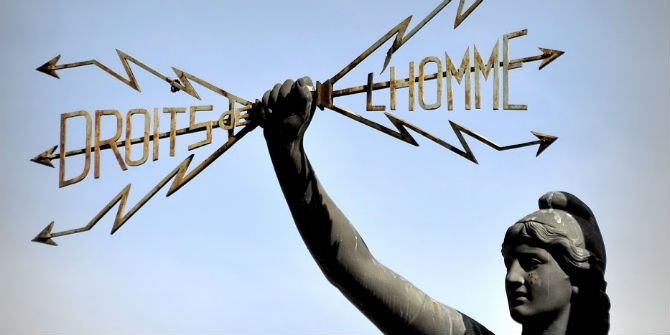Three main claims made by advocates of ‘Lexit’ – a ‘Left Brexit’ – are that the EU prevents the UK from ‘wholesale state intervention in the economy’, the EU is bad for workers’ rights, and that it cannot be reformed. All three claims are mistaken, argues Ewan McGaughey (King’s College London), because the EU supports any system of property ownership, it is constitutionally prevented from suppressing worker rights, and it is being continually reformed – far better than the international trade system.
The biggest threat to the left isn’t the EU. It’s not understanding what we have, not knowing what we want, or (if we do know) how to get there. What’s necessary now more than ever, as the great labour lawyer, Lord Wedderburn, wrote is ‘hard legal analysis allied to an alternative social vision’. If you want democracy, socialism and internationalism, you want universal social rights. Countries and states build prosperity with rights beyond that minimum, and everyone has a voice in our economic constitution: for fair pay, health, education, democratic public services, and a democratic economy. This is not what advocates of ‘Lexit’ (a supposed ‘Left Brexit’, best represented by ‘The Full Brexit’ blog) are likely to achieve. Brexit is not a policy. It’s the absence of a policy. It’s the biggest threat to democracy in the modern world, which is why Putin’s Kremlin backed it through cyber-war, and allegedly laundered the largest donation through Arron Banks.
Public ownership guaranteed in EU law
First, the EU treaties say they ‘shall in no way prejudice the rules in Member States governing the system of property ownership.’ (TFEU art 345). Yet Lexit advocates claim ‘liberalisation directives… compel governments to retain the market system in gas, electricity, rail, mail and telecommunications’ and ‘rule out 1945-style sectoral nationalisation’, but don’t say how. The author of this claim cites his own book (without page references) but the book nowhere credibly supports that claim (e.g. p.111-114). It’s mistaken on everything, including gas, electricity, mail and telecomms. Let’s just focus on rail, and ignore that Italy, France, Sweden etc, all have fully-nationalised railways. The Railways Directive 2012 article 10 says rail tracks must give ‘the right to access’ under similar conditions, so that a train from France can come onto UK tracks. Member states must apply the same conditions. But if the UK wanted only publicly owned trains on publicly owned rail, this would be fine. It’s our own railways law that demands privatisation: the Railways Act 1993 section 25 says the only government that cannot own UK trains is our own. As with everything else, Lexit advocates should be attacking the UK government, not the EU.

Workers’ rights stronger
Second, the EU treaties only allow for the creation of minimum standards in workers’ rights (TFEU art 153(2)(b)). Constitutionally the EU simply cannot apply maximum standards. However, a group of libertarian UK lawyers tried to change this with a group of notorious cases starting with Viking Line v ITF. They argued, with initial success, that business’ freedom of establishment and right to provide services trumped the right to collectively bargain and take action. These cases were swiftly contained by the Rome II Regulation preamble, and recently a new Posted Workers Directive, and Public Procurement Directive. Most major improvements in workers’ rights since 1979 have been through EU law, against UK grudges. Social Europe has been far more resilient than social Britain. When the EU is at its worst, it’s because it’s following evidence-free ideology, and a politics of neoliberal inevitability, that comes from the UK – like the ‘age of austerity’ that went straight from David Cameron’s mouth into the cuts in Greece. Ironically, Lexit advocates support the most malevolent steps against workers’ rights in modern times: ending the right to work, ending the right to freedom of movement, reviving nation-based discrimination. They think they will raise wages by reducing immigration: another evidence-free myth. When sectoral collective bargaining is restored – the best practice among EU member states – everyone will have fair wages, whatever the labour market’s size.
Democracy in a global economy
Third, it’s argued that the EU cannot be reformed. But the fundamental problem, to which Brexit advocates have no answer, is that without the EU the international trade system is a punishing autocracy. The country with the greatest bargaining power used to win: Canada, Australia or NZ adhere to the deal the US wants. But today, multinational corporations are able to play off and dominate all countries, like the East India Company did with the Mughal princes in the 18th century. The EU answers that danger because it replaces international governance by contract and power, with governance through votes and laws. Like the UK (with a monarch, hereditary peers, and suppression of local councils), the EU still has a democratic deficit. This is nothing compared to the void of voice in international affairs. The UK’s first taste of a take-it-or-leave-it trade deal is its own Withdrawal Agreement (which, ironically, protects most workers’ rights, etc, against UK government cuts). But if we remain (and once we get a government that truly believes power should be in the hands of the many, not the few) the UK will continue to amplify its influence through the EU. Together with the EU, not alone, the UK has true sovereignty and the capacity to forge a socially just world.
Solidarity and Union
The reasons that 27% of the UK population (17.5m from 65m) voted to Leave were many: a demand for meaningful improvement in their lives, more spending on the NHS, fair wages. But the vote was fuelled by spending fraud on the part of the leave campaigns (Vote Leave, Leave.EU) and Russian backed cyber-war. Europe’s second-last dictator, Vladimir Putin, is an avowed opponent of socialism, internationalism and democracy. He really wants Brexit. Why would anyone want what Putin wants? Lexit advocates say the ‘only solution’ to get their unarticulated vision is tearing up the Good Friday agreement, dividing Irish families, risking armed conflict, and capitulating to global capital without a plan. But there is an alternative. It’s called solidarity. It’s the strength of our common endeavour. It’s called a Union.
This post represents the views of the author and not those of the Brexit blog, nor the LSE. This blog draws upon a forthcoming article, ‘Could Brexit be void?’ (2018) King’s Law Journal.








The same tired old propaganda and myths that lost remain the independence vote.
How is Brexit a threat to democracy when it takes power back from appointed bureaucrats and gives it to elected representatives? How do we vote President Junker out?
UK workers rights exceed EU rights in many cases. For example minimum holiday entitlement. And whats the EU minimum wage?
There is a self interested, so called “elite”, in society that think they should be allowed to overturn a democratic vote for independence and enslave the UK in a deeply unpopular EU that less than 25% of the population voted for.
This anonymous internet grump throws up important points – because everything s/he says is factually wrong. It’s completely wrong that the UK goes beyond the EU minimum holiday entitlement – the UK does the bare minimum: 28 days or 4 weeks of paid holidays a year. In fact, we tried to argue that we only need to give 20 days, until pressured to change. A UK govt adviser, Taylor, recommended effectively scrapping even this with rolled up holiday pay. There’s no EU minimum wage because it’s constitutionally prevented from creating one. You can vote Junker out by using our power in the Council of Ministers. You won’t be able to vote for anything in a post-Brexit set of bilateral trade deals. “No2EU” wants to sell the UK into permanent dependence on big countries, trading blocs, and to multinational corporate power, but doesn’t even realise it.
“The EU gives workers the right to 20 paid days off, but the UK government has increased the entitlement to 28.”
https://fullfact.org/europe/eu-and-paid-holidays/
You agree that the minimum wage is down to the UK government, not the EU.
The UK electorate have no power to remove any of the EU commissioners or presidents.
“‘No2EU'” wants to sell the UK into permanent dependence on big countries, trading blocs, and to multinational corporate power”
It’s those big corporate powers that can lobby and influence the EU while the man in the street has no influence.
Please don’t believe everything you read on the internet. Your “full fact” website is completely wrong. Maybe you should write to them.
The EU minimum paid holiday period is 4 weeks – that is 28 days. This is the Working Time Directive article 7 (and a “week” is seven days – in case it’s not obvious – by looking at article 6): https://eur-lex.europa.eu/legal-content/EN/ALL/?uri=CELEX:32003L0088
“Please don’t believe everything you read on the internet.”
Should I believe something on a site that spews out pro-EU propaganda, like the LSE, or should I believe something on a respected site that tries to present an unbiased view of the facts?
A week for me, and most working people, is 5 work days. 4 x 5 = 20 days
Disingenuous claptrap. All the empirical evidenve and discernable reality says you’re wrong.